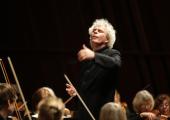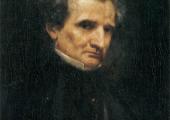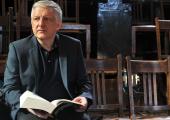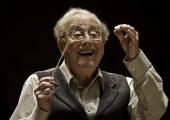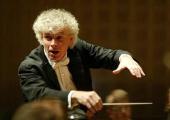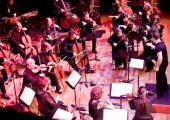In 1860 Wagner sent a full score of his recently published Tristan und Isolde to Berlioz, inscribing it: “To the great and dear composer of Roméo et Juliette, from the grateful composer of Tristan und Isolde.” The bonds between these two works go far beyond emotion, as last night’s inspired piece of programming from Simon Rattle and the Orchestra of the Age of Enlightenment proved. A phalanx of nine double basses watching over the swollen orchestral forces of the OAE set the tone for an evening whose “authenticity” was anything but dusty.
Six years after their triumphant Rhinegold, the unexpected partnership of Rattle, the OAE and Wagner have returned to the Proms, this time taking on the even greater challenge of a period Tristan – albeit only Act Two. Spanning the lovers’ move from private uncertainty to fully declared (and unwittingly public) ardour, this act has a sense of intimate detachment from the rest of the opera. Framed at the beginning and end by the receding calls of the royal hunting horns and the sudden return of King Mark, the central section sees even the faithful Brangäne melt away, leaving the two lovers alone to reach musically towards the purest expression of Wagner’s “true happiness of love”.
It’s a section that makes sense as an excerpt, but demands much from singers, denied the aid either of sets or the dramatic build-up to such intensity. Leading the way was Violeta Urmana’s Isolde, whose tone is so perfectly produced as to bypass the forceful, big clichés of Wagner singing, even in a space like the Royal Albert Hall. With a purity that sits well with this determined young heroine, she captured both the expansive lines and single-minded focus of Isolde, coming into her expressive own in the charged opening discussion with Brangäne.
It was lovely to see baroque darling Sarah Connolly, more often heard performing the likes of Handel with the OAE, making the transition along with the orchestra into this wildly different repertoire. Her Brangäne was ripe with gorgeous tone colours, particularly the Watchsong, her position at the back of the Choir lending it a dramatic potency matched only during the evening by Franz-Josef Selig’s heartbreaking “Mir dies?” – surely the most welcome of musical interruptions. Gravely noble and surprisingly well projected, his King Mark was a late star of the evening, taking the pressure off the massively over-faced and struggling Ben Heppner.
I’ve never had the pleasure of hearing Heppner in good voice, and while I’m sure accounts of his vocal and dramatic capabilities are true, the fact remains that his notoriously troubled voice is letting him down more often than not these days. When he doesn’t actually pull out of a project he frequently sounds as though he should have, and last night was no exception. It never bodes well when a tenor is cracking and straining within the first 10 minutes of Tristan, and vocal (not to mention dramatic) suicide to attempt to carry on regardless.
Translucent and flexible, the “authentic” interpretation was so musically convincing as to overcome its novelty.
Carry on Heppner did, however, with a gripped tone and adolescent hope-and-a-prayer approach to top notes that simply weren’t on offer. The whole experience, far from transcendent and pure emotion, was one that left the audience nervously anticipating the next crash. Credit must go to Urmana, who staunchly continued to emote despite the intonation issues next to her, and the fact that Heppner was giving her all the dramatic impetus of a tea cosy. Heaven help next year’s Covent Garden Peter Grimes.
Translucent and flexible, the “authentic” interpretation of Rattle and the OAE was so musically convincing as to overcome its novelty. The sharper than baroque, less sharp than contemporary concert pitch of A=437 took a little getting used to, but together with German instruments brought a darker timbre to proceedings that was particularly striking after the bright French textures of the Berlioz.
I can’t help feeling that with his love of technical innovation and excess Wagner would have welcomed the greater brute force of the contemporary orchestra, but the clearly defined textures of the period interpretation made sense of his multi-layered motivic writing, drawing the eye more frequently beneath the dense surface of massed strings. And you can’t argue with the bluntly atmospheric impact of five single F horns – an absolute joy.
With his prologue of Romeo et Juliette, Rattle placed the Wagner in context both musically and texturally. Providing a different period sound for this work (using instruments made to the French model familiar to Berlioz), the orchestra showcased the expressive range of an approach that goes beyond mere academic curiosity.
With contemporary-instrument Rattle still to come at this year’s Proms, the OAE have laid down a colourful, many-textured gauntlet for the Wagner of unlikeliest of competitors, the Berlin Philharmonic.


